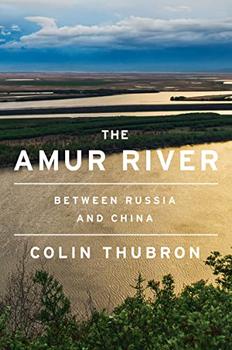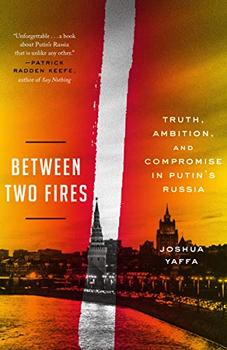Summary | Excerpt | Reviews | Beyond the book | Read-Alikes | Genres & Themes | Author Bio

To explain how he embarked on Travels in Siberia, and how he stuck with it over sixteen years and multiple trips to Russia, Frazier invokes an infectious condition he calls "Russia-love." When he steps off the plane in Moscow for the first time he sees a sign labeled "Exit" with an arrow pointing to the left. He goes left, and meets with a soldier pointing him back the way he came:
"I was thoroughly stunned. Love, with an assist from novelty, had blindsided me. I had been overcome, lost permanently. This kind of thing happens to people in middle age, I realize. It's embarrassing. The feeling began the minute I stepped off the plane, with the absurd business of the exit sign and the correcting soldier."
The craziness of Russia intoxicates Frazier. It's a country that reveres literature and has produced great books; it's also a country where unspeakable horrors have been committed and covered up for centuries. He tries to define a formula for this contradiction, seeing Russia "as both great and horrible, or as the greatest horrible country in the world." It is telling that his first exposure to Russia comes through his friendship with Komar and Melamid, the famous Russian conceptual artists who were groundbreaking in their ability to make hay out of the over-the-top iconography of the crumbling Soviet Union. Even a small dose of Russia can shake an American out of his bourgeois comfort zone, and the Siberia Frazier describes is a hearty draught of strangeness - barren landscapes, piles of trash, rugged individuals, mercenary mosquitoes. Those who are already afflicted with a chronic case of Russia-love will revel in this book, and readers for whom it is new material may risk coming down with it themselves. Many who encountered excerpts from the book in The New Yorker have already caught a whiff of contagion.
Frazier has crammed an encyclopedic amount of information into this book, but never fails to keep the momentum going. A master of the good yarn, he can tease out the best stories and the most telling anecdotes from his material, whether the focus is on medieval history or escapades with fellow travelers. Many of the tales, facts, and historical tidbits Frazier relates are too good not to share, and readers may find themselves irritating their roommates and domestic partners by constantly poking them and exclaiming, "Listen to this!" Above all, Frazier taps into the strain of humor particular to Russia. The comic moments in this book, tinged as they are with horror (as when he gets his first glimpse of a Siberian public toilet) are incredibly satisfying. He gets the balance just right - there are intelligent laughs to be had, even when Siberia is at its coldest.
Frazier approaches his broad expanse of material organically, plotting out the book on a chronological trajectory that mimics his own burgeoning acquaintance with Siberia. We get the basic facts first, as he did, and then delve into deeper explorations of the history of the region as he plans his next trip. We meet a parade of memorable personalities, from the Quixotic Alaskan real-estate agent dreaming of an international tunnel under the Bering Strait, to the curator of the Museum of the Magadan Highway reciting her poems on World War II air power. Real people stand side-by-side with historical personages (Ivan the Terrible, Genghis Khan, the Decembrists).
The book is laid out in five parts, each part corresponding to a separate trip to Siberia. The longest part (Part III) describes his most epic journey, 6,000 miles across the continent in a rattletrap minivan with two occasionally surly guides and a satellite phone. The trip has all the narrative tension of a good novel - will he get where he wants to go and see what he wants to see, or will a barrage of obstacles (car trouble, the irrational whims of his guide, food poisoning) throw him off course?
The fact that Travels in Siberia is, at its heart, a travel book, rather than a history or a political analysis or an environmentalist call-to-arms, means that it stays on a human scale. The territory is vast, and so are the implications of Siberia. Frazier stays close to his seeing eye - he does not make grandiose analyses, but sticks to trying to capture what he observes. (While there are a few photographs in the middle of the book, most of the travel illustrations scattered throughout are Frazier's own line drawings.) When he wants to convey the importance of what he is seeing, he stays grounded in the moment. When he discovers the grim site of an old prison camp preserved in the permafrost, he resists the temptation to draw sweeping conclusions. He imagines the commemorations he wishes were there - plaques, memorials, grave markers. Then he gets back in the car and moves on.
In spite of its length, Travels in Siberia is only the beginning of an important conversation. Frazier is clear about the fact that Siberia is going to figure largely in the big discussions of our century - about oil drilling, commercial expansion, global warming. By giving Americans the lay of the land, he helps ensure that when Siberia comes up, we will understand enough to have something to say.
![]() This review was originally published in The BookBrowse Review in November 2010, and has been updated for the
October 2011 edition.
Click here to go to this issue.
This review was originally published in The BookBrowse Review in November 2010, and has been updated for the
October 2011 edition.
Click here to go to this issue.

If you liked Travels in Siberia, try these:

by Colin Thubron
Published 2022
The most admired travel writer of our time - author of Shadow of the Silk Road and To a Mountain in Tibet - recounts an eye-opening, often perilous journey along a little known Far East Asian river that for over a thousand miles forms the highly contested border between Russia and China.

by Joshua Yaffa
Published 2021
From a leading journalist in Moscow and correspondent for The New Yorker, a groundbreaking portrait of modern Russia and the inner struggles of the people who sustain Vladimir Putin's rule.
Your guide toexceptional books
BookBrowse seeks out and recommends the best in contemporary fiction and nonfiction—books that not only engage and entertain but also deepen our understanding of ourselves and the world around us.